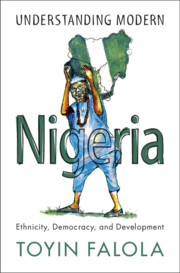Book contents
- Understanding Modern Nigeria
- Understanding Modern Nigeria
- Copyright page
- Dedication
- Contents
- Figures
- Maps
- Preface
- Acknowledgments
- Part I Introduction
- Part II Context and History
- Part III Democracy and Governance
- Part IV Development Crises
- Part V Reforms and Revolutions
- 19 Change Agents: Youths and Politics
- 20 Hashtags and Social Protests: Reformation and Revolution in the Age of Social Media
- 21 Reformist Option: Grassroots and Political Activism
- 22 Revolutionary Option: Social Movements and Power to the Citizens
- 23 Nationalist Ethos, Collective Reformation, and Citizenry Power
- 24 Popular Culture and Politics
- Part VI Conclusion
- Bibliography
- Index
20 - Hashtags and Social Protests: Reformation and Revolution in the Age of Social Media
from Part V - Reforms and Revolutions
Published online by Cambridge University Press: 09 June 2021
- Understanding Modern Nigeria
- Understanding Modern Nigeria
- Copyright page
- Dedication
- Contents
- Figures
- Maps
- Preface
- Acknowledgments
- Part I Introduction
- Part II Context and History
- Part III Democracy and Governance
- Part IV Development Crises
- Part V Reforms and Revolutions
- 19 Change Agents: Youths and Politics
- 20 Hashtags and Social Protests: Reformation and Revolution in the Age of Social Media
- 21 Reformist Option: Grassroots and Political Activism
- 22 Revolutionary Option: Social Movements and Power to the Citizens
- 23 Nationalist Ethos, Collective Reformation, and Citizenry Power
- 24 Popular Culture and Politics
- Part VI Conclusion
- Bibliography
- Index
Summary
“Hashtags and Social Protests: Reformation and Revolution in the Age of Social Media” seeks to understand the actualizing agency of social media as a tool of reformation and revolution in Nigeria, considering its most compelling feature is the availability of information. With the help of social media, information, constantly regenerating, is made readily available almost instantaneously to a large number of audiences in different places across the world, and each person has the autonomy to modify or mediate such information. This study positions this mass mobilizing effect of social media as significant to social revolution and protest, and argues that it is no mere coincidence that the makeup of both social media and social movements are revolutionary; it indicates the mutual complementarity of both phenomena toward the progress of society. Hence, there is the need for existing labor unions, pressure organizations, and social movements in Nigeria to integrate social media as a vital part of their communication agency to create awareness, mass mobilize, and achieve their collective goals for the development of society and the people. In light of this, this study examines the revolutionary contributions made by social media in communication and marketing as increasingly being driven towards politics, governance, and human rights activism, which portends better societal development, stronger democracy, and safer societies for everyone.
- Type
- Chapter
- Information
- Understanding Modern NigeriaEthnicity, Democracy, and Development, pp. 483 - 509Publisher: Cambridge University PressPrint publication year: 2021



